Dallas Woodburn's Blog, page 15
May 3, 2012
Guest Post by Sarah Rexman
Guest Post by Sarah Rexman
Get Your Writing Flowing
One of the most difficult aspects of becoming and staying a writer is finding a way to produce writing on a consistent basis. There are many different ideas and theories about mastering the craft of writing, but the one thing that ones through them is the need to write consistently. In On Writing, Stephen King advises, “If you want to be a writer, you must do two things above all others: read a lot and write a lot.” If you are struggling to fit writing into your everyday schedule or if you do not feel that you are making enough progress on your current project you may want to pump up the amount of time you devote to your writing each day.
Schedule Your Writing Time
Some people say that you should schedule the same block of time to write each day. It gets your body and mind ready to write and it makes it easier to get the words down on paper, because you have conditioned your mind and body to respond to be creative at the same time every day. However, that may not work for some people, who do not have a consistent schedule or who may work odd hours. It doesn’t matter if you set aside the same chunk of time each day or if you schedule your writing at a different time each day of the week as long as your are consistently scheduling it and spending time writing. Decide how long you want to write each day or how many hours you want to log a week and stick to it.
Write During Your Writing Time
It is also important to remove all distractions when you are writing. If you write on your laptop, it is so easy to get on your Internet browser and start looking for details on the sword you need for your next plot point, or to quickly check in at the writer’s forum you visit to get inspiration and feedback. Or you may need to tweak your writing playlist just a little bit so that it better fits the mood of your chapter - you get the basic idea. Once you sit down to write, make sure that you actually write. Type words out and do what you have to in order to avoid distractions. Turn your wireless Internet off. Go somewhere without Internet access or set up a program that won’t let you log back on for a set amount of time. If you can eliminate your distractions you will be able to focus and get your story out on paper.
Avoid Interruptions
This may be the most difficult aspect of all for many writers. You can turn off your cell phone, but you cannot stop family, friends or roommates from interrupting you. You will need to work to “train” your family and friends not to bother you when you are writing. My college creative writing instructor had a signal worked out with her children. If the office door was shut, they were not to enter unless someone was actually dying. They were old enough to fend for themselves at that point. If you have young children you may be writing around nap and bed times. Set up a signal for your family and then stick to it. Don’t answer the phone, or the door when you are writing. Getting the time in is worth the extra effort.
Bio: Sarah Rexman is the main researcher and writer for bedbugs.org. Her most recent accomplishment includes graduating from Florida State, with a degree in environmental science. Her current focus for the site about bed bugs which includes descriptions and bed bug pictures. Dallas Woodburn
author, speaker, freelance writer
founder of Write On! Books and Write On! For Literacy
www.writeonbooks.org
http://dallaswoodburn.blogspot.com/
April 27, 2012
Honored with Teaching Award from Purdue!
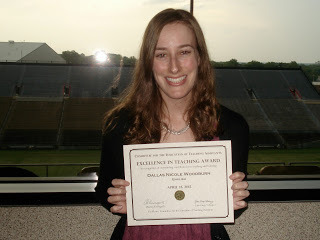
Exciting news! I've been honored with a Committee for the Education of Teaching Assistants (CETA) Teaching Award from Purdue! I am humbled and thrilled for this recognition. Four graduate student teachers were chosen out of the entire English Department, and we were honored at a ceremony with other graduate student teachers from all across the university. It was a very special night! I truly love teaching and I feel very blessed I get the opportunity to teach undergraduates while pursuing my MFA at Purdue.
I'm currently teaching English 205: Introduction to Creative Writing and English 106: Academic Writing and Research (a basic composition course all freshmen are required to take.) Next semester I've been accepted to teach English 420: Business Writing. I am looking forward to "paying forward" and hopefully inspiring Purdue's business students in the same way the terrific professors Patrick Henry and Tommy Knapp inspired and encouraged me when I was an undergrad student in the Entrepreneurship program at USC.
This was our last week of classes at Purdue, and some of my wonderful students asked to take a picture with me after our last class. Here we are in the hallway outside our classroom:

I believe teaching is a symbiotic learning relationship with my students, and I am certainly inspired by their hard work, intelligence, creativity and kindness every day!
Dallas Woodburn
author, speaker, freelance writer
founder of Write On! Books and Write On! For Literacy
www.writeonbooks.org
http://dallaswoodburn.blogspot.com/
April 25, 2012
Words of Advice from Ann Patchett

I fell in love with Ann Patchett's writing when I read her amazing, PEN/Faulkner Award-winning novel Bel Canto. She is the author of many other novels including Run, The Patron Saint of Liars, and most recently State of Wonder.
I was thrilled to read an interview with her in a recent email newsletter from the literary magazine One Story. Here are some snippets of advice from Ann that I think all writers can hold dear:
Show kindness whenever possible. Show it to the people in front of you, the people coming up behind you, and the people with whom you are running neck and neck. It will vastly improve the quality of your own life, the lives of others, and the state of the world.
Buy your books at independent bookstores and tell your friends to do the same because if we don’t take the lead, no one else will.
[My mentor] Allan Gurganus taught me how to write, which was extremely helpful. I tried to follow his example of hard work, though never came close to matching his sense of elegance and style. He is a very generous soul. I didn’t match him there either but he taught me a great deal.
My favorite piece of Gurganus advice was that I must always steer the ship of my own career and not assume anyone else was looking after things as I would. If my name was on the book then I must agree with every aspect of it. This has been hugely important to me. Dallas Woodburn
author, speaker, freelance writer
founder of Write On! Books and Write On! For Literacy
www.writeonbooks.org
http://dallaswoodburn.blogspot.com/
April 17, 2012
Write On's Summer Writing Camp!
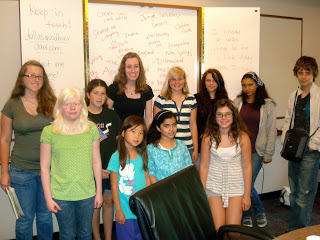
This year is the FIFTH ANNUAL Write On! Summer Writing Camp!
What: Students will have FUN while learning how to improve central components of their writing, including dialogue, characterization, plot and setting, through various creativity-inducing writing exercises.
Who: Students ages 8-18. Poets, playwrights, short-story writers, future novelists – all are encouraged and welcome to join!
When: May 19 & 20 and May 26 & 27. There are two time sessions available: mornings from 10am-noon or afternoons from 1-3pm. It is perfectly all right if you can only make one of the weekends, or even just one day — I’d love to have you join us!
Where: In the conference room of Jensen Design & Survey in Ventura at 1672 Donlon Street (near Target).
How: If you’re interested in getting signed up, simply download, print and send in the PDF of the registration form at www.writeonbooks.org. There are early-registration and returning camper discounts available! Proceeds benefit Write On! For Literacy, my organization that empowers youth through reading & writing projects including an annual Holiday Book Drive for underprivileged kids.
Hope to see you this summer!
author, speaker, freelance writer
founder of Write On! Books and Write On! For Literacy
www.writeonbooks.org
http://dallaswoodburn.blogspot.com/
April 9, 2012
New Blog: Day-by-Day Organization

Exciting news: I've started a new blog project! It's called Day-by-Day Organization and the web address is http://daybydayorganization.wordpress.com.
I'll still be keeping up with this blog, which will as always be my home for all things reading, reading, Write On! For Literacy, and creativity related. But lately I've been reading a variety of organization blogs -- some of my favorites include i Heart Organization and I'm an Organizing Junkie, and I also love general-interest happy blogs like my friend Lauren Cook's The Sunny Girl. These blogs add a dose of sunshine to my day and inspire me to tackle those stress-festering projects in my own life that I've been putting off.
I've posted on here before about the importance of being organized -- how it can help clear away stress and de-clutter your mind so your creative subconscious can shine. I always feel happier, more calm and less stressed when my space is neat and free of clutter. I once read that the average person wastes 40 minutes a day — 40 minutes every day! — looking for things they have misplaced. I don't know about you, but I for one don't want to waste my time that way!
But up till now, my organization has tended to look like this: a day-long cleaning phase where I'll get my apartment straightened up pretty well, but two days later it will start to look cluttered again, and the hectic pace of daily life will sweep away any progress I attempted to make. It's been difficult for me to find the time or money to get organized in a meaningful and permanent way.
Well, I want to change that! Now is the time. I know I will be a happier writer, teacher, and overall person if I get my space organized once and for all. I'm creating Day-by-Day Organization to chronicle my journey!
Being a grad student means I don't have much spare time — or spare money. It would be impossible to try to organize my entire apartment in one day. Just thinking about it is overwhelming. That's why I'm planning to focus on little, inexpensive changes, one day at a time. Day by day, I am going to organize my life. I hope that my progress might inspire you, too! I'm also planning to share quick and healthy recipes, happiness-boosting reflections, and any resources I find that help me make the most of daily life.If you have a couple minutes to spare, please check out my new blog and let me know what you think! You can even subscribe by entering your email address in the sidebar on the right-hand side, right under the photo of me. Hope you like it!Dallas Woodburn
author, speaker, freelance writer
founder of Write On! Books and Write On! For Literacy
www.writeonbooks.org
http://dallaswoodburn.blogspot.com/
April 6, 2012
Lessons from Pablo Neruda
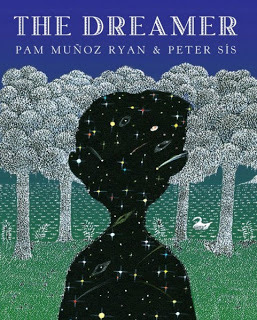 I am reading an amazing book right now called The Dreamer that is a fictionalized retelling of the childhood of Nobel-Prize-winning poet Pablo Neruda. (I'll post a review of the book on here when I'm done reading it!) For now, I wanted to share with you some quotes by Pablo Neruda and some quotes by author Pam Munoz Ryan about his writing and life that I found incredibly inspirational -- hope they inspire you, too!
I am reading an amazing book right now called The Dreamer that is a fictionalized retelling of the childhood of Nobel-Prize-winning poet Pablo Neruda. (I'll post a review of the book on here when I'm done reading it!) For now, I wanted to share with you some quotes by Pablo Neruda and some quotes by author Pam Munoz Ryan about his writing and life that I found incredibly inspirational -- hope they inspire you, too!Neruda wrote to the common person and about the common thing. He thought that when people touched an object, their fingers left a bit of presence upon it and that a bit of their being was somehow absorbed in the object's memory. He believed that all the stories he ever needed already existed and that their inspiration would be found in the simplest things and the most minute details: in the garden tool, the rolling pin, or the uneven table on which bread was kneaded. Neruda was fascinated by what he called "the permanent mark of humanity on the inside and the outside of all objects."
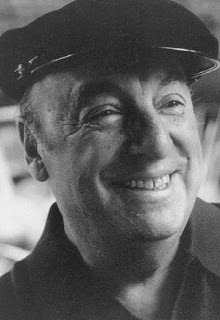 He said, "It is very appropriate ... to look deeply into objects at rest. ... They exude the touch of man and the earth as a lesson to the tormented poet. ... The flawed confusion of human beings shows in them ... the prints of feet and fingers. ... That is the kind of poetry we should be after, poetry worn away as if by acid, by the labor of hands, impregnated with sweat and smoke, smelling of lilies and urine, splashed by the variety of what we do."
He said, "It is very appropriate ... to look deeply into objects at rest. ... They exude the touch of man and the earth as a lesson to the tormented poet. ... The flawed confusion of human beings shows in them ... the prints of feet and fingers. ... That is the kind of poetry we should be after, poetry worn away as if by acid, by the labor of hands, impregnated with sweat and smoke, smelling of lilies and urine, splashed by the variety of what we do."Neruda even applied emotion to his pen, preferring to write in green ink, because he thought it was the color of esperanza -- hope. Dallas Woodburn
author, speaker, freelance writer
founder of Write On! Books and Write On! For Literacy
www.writeonbooks.org
http://dallaswoodburn.blogspot.com/
April 3, 2012
Guest Post by Sean Gray
by Sean Gray
More and more because of today's economy, people are starting their own businesses. However, the money problems that plague them personally will follow them in their business lives unless they learn how to manage their money differently. For these folks, some basic money 101 is in order. Fortunately, there are a number of books, which not only teach the principles of personal finance, but give readers some ideas about how they can apply these personal lessons to their business's bottom line. These books are both enjoyable and practical.
The Total Money Makeover by Dave Ramsey
"The first hurdle is Ignorance. In a culture that worships knowledge, to say ignorance about money is an issue makes some people defensive. Don't be defensive. Ignorance is not a lack of intelligence; it is a lack of know-how." Pg 78
No business can succeed for long without sound finances to keep it afloat. Unfortunately, many new business owners are not equipped to deal with the financial aspects of their businesses due to their ignorance about how money works. But according to Dave Ramsey, it's not something they need to feel badly about; it's something that they need to do something about. In this case, they should educate themselves about the principles that govern wealth and the flow of money in their lives. As Ramsey says in his book, no one expects a baby to be born knowing how to drive and yet people are expected to know how to deal with money without being taught. This isn't sound wisdom for personal or professional financial growth.
The Total Money Makeover gives people practical baby steps that will help them learn to think about their finances differently. Ramsey himself is a businessman, who knows personally how ignorance can damage a person's bottom line. Ramsey went broke, because he knew little about how money works. He was able to regain his wealth and rebuild his business and then some, because he learned the principles of how to take care of money. The book is easy to read and offers simple, but effective principles for taking control of one's finances once and for all.
The Richest Man in Babylon by George S. Clason
"Algamish, you are very rich man. Tell me how I may also become rich, and all night I will carve upon the clay, and when the sun rises it shall be completed." Pg 12
This is the answer to the unspoken question of the previous book recommendation: Where does one learn how to take care of his or her wealth? Most people grew up in households where money wasn't discussed nor were they around people who truly knew how to make money. As a result, they have gotten their knowledge of how money works and have taken money advice from someone who's broke.
However, the best money and business managers don't do this. Instead, they seek out the advice from people who have considerable wealth—not the conspicuous wealth—think luxury cars, big houses and designer clothing that often has nothing behind it—but rather from people who have investments and money in the bank. This is one of the key principles in the book The Richest Man in Babylon.
The financial principles in this book are revealed through a series of parables that make the lessons enjoyable. The book arose from a series of pamphlets that banks and insurance companies distributed. Although, the book does not give the specifics of where to invest, it does offer basic sound advice that everyone must follow before they gain any kind of wealth, regardless of the types of investments they involve themselves in. Its principles work regardless of whether a person applies them to his or her business or personal money matters.
Elizabeth I CEO by Alan Alexrod
"Elizabeth, a leader of great spiritual force and personal magnetism, devoted a large portion of her personal genius to creating and maintaining her popular image as the Virgin Queen, an almost unnatural presence of earth. She was eminently practical, a hard-nosed pragmatist with an eye on the bottom line and absolutely no tolerance for waste, for excuses, or for the airy and endless arguments of theoreticians." Pg 203
Once the new business owner has mastered the basics as taught by the previous two books, he or she is ready for some more advanced lessons. Elizabeth I CEO teaches business principles through the lens of one of the greatest leaders in world history. Elizabeth herself inherited a broke and crumbling kingdom. The kingdom she left upon her death had been completely turned around and the country was thriving.
This book deals with the idea that the business person is not separate from the private person. The good queen held herself accountable and recognized that she could not effectively rule over others until she learned to rule over herself. The lessons in the book include financial ones, but there's also sections on leadership and perseverance and often the principles are demonstrated through the queen's own words.
Bio: Sean Gray operates his own business called we buy cars San Diego, and uses information from various books to do so. Dallas Woodburn
author, speaker, freelance writer
founder of Write On! Books and Write On! For Literacy
www.writeonbooks.org
http://dallaswoodburn.blogspot.com/
March 16, 2012
Guest Post by Lauren Bailey
A Few Words on Originality in Creative Writing
by Lauren Bailey
Even the Bible, written over 2,000 years ago, proclaims it: there is nothing new under the sun. As writers one of the greatest challenges we face is the fear that we are unoriginal. A library that contained all the projects abandoned when its author feels derivative of another work would be the largest on Earth, larger even than the historical library at Alexandria.
The fear is not an irrational one, especially when critics praise new literature for its novelty — and given that post-modern literature tends to become stylistically inventive and at times even obscure, there seems to be a lot of pressure to bring constant innovation not only to the content but also to the form of literature.
Still, too many new authors are too easily discouraged by this originality "requirement," which is mostly imaginary and almost always misinterpreted.
Granted, writing any work of literature, be it poetry, short stories, novels, biographies, or anything in between, does demand some degree of creativity — you can't write anything if you don't have an idea. But the "requirement" ends there, at least in terms of sweeping innovation.
If you have an idea, you are already innovated enough to be original.
Anything you write will ultimately be influenced by other sources you've encountered throughout your life. It's inescapable. But that doesn't make your work unoriginal. And that's what authors need to remember at all times.
How many romance or fantasy novels do you think have been published? More than you could keep in your house, or even all the houses on your block, probably. Wuthering Heights was a romance novel, among many others dating even farther back in time. Yet new romance novels are written and published every day.
Are each of these works totally inspired and absolutely new? Absolutely not.
Take a more "sophisticated" example: Jonathan Franzen's The Corrections. Stripped of characterization and specific plot lines, The Corrections is a coming-of-age novel about families in the era of technology. Family plots and coming-of-age stories are as numerous as the stars.
The fact that someone else in history had written a story about families didn't stop Franzen, though, and critics are still praising it as one of the major works of American fiction in the last decade.
What distinguishes Franzen's novel from any other coming-of-age story? The answer is simple: Franzen. Ultimately the difference comes from the fact that Franzen and no one else wrote The Corrections. Only he could bring his particular insights, turns of phrase, dialects, plot twists, characters to the book in the way he did.
You aren't Jonathan Franzen, but when you write, you bring your own set of experiences to the table and tell stories differently than anyone else. Give the same writing prompt to 20 people and all of them will write a different story.
So the next time you are worried about your story being unoriginal or derivative, try to subdue the voice in your head that's saying that, and just write the story. You'll never know if it is original or not if you don't write it.
Bio: This guest post is contributed by Lauren Bailey, who regularly writes for accredited online colleges. She welcomes your comments via email: blauren99 @gmail.com. Dallas Woodburn
author, speaker, freelance writer
founder of Write On! Books and Write On! For Literacy
www.writeonbooks.org
http://dallaswoodburn.blogspot.com/
March 12, 2012
Interview with Christina Katz, author of The Writer's Workout
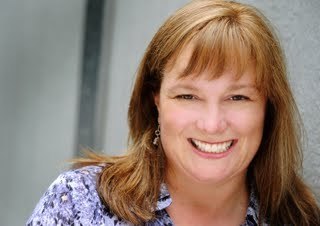 Christina Katz is the author of three books from Writer's Digest: The Writer's Workout, Get Known Before the Book Deal, and Writer Mama. Her writing career tips and parenting advice appear regularly in national, regional, and online publications. A "gentle taskmaster" over the past decade to hundreds of writers, Christina's students go from unpublished to published, build professional writing career skills, and increase their creative confidence over time. She holds an MFA in creative writing from Columbia College Chicago and a BA in English from Dartmouth College. A popular speaker on creative career growth, Christina presents for writing conferences, literary events, MFA writing programs, and libraries. She is the creator and host of the Northwest Author Series in Wilsonville, Oregon, where she lives with her husband, her daughter, and far too many pets. Learn more at ChristinaKatz.com.
Christina Katz is the author of three books from Writer's Digest: The Writer's Workout, Get Known Before the Book Deal, and Writer Mama. Her writing career tips and parenting advice appear regularly in national, regional, and online publications. A "gentle taskmaster" over the past decade to hundreds of writers, Christina's students go from unpublished to published, build professional writing career skills, and increase their creative confidence over time. She holds an MFA in creative writing from Columbia College Chicago and a BA in English from Dartmouth College. A popular speaker on creative career growth, Christina presents for writing conferences, literary events, MFA writing programs, and libraries. She is the creator and host of the Northwest Author Series in Wilsonville, Oregon, where she lives with her husband, her daughter, and far too many pets. Learn more at ChristinaKatz.com.So, what's The Writer's Workout all about?
The Writer's Workout contains 366 ideas—one idea per day—intended to encourage writers into prosperous action. It reviews critical skills for every writer such as improving craft, learning to sell work, how and when to specialize, ways to keep learning and growing, self-promotion from the basics through advanced topics, and how to balance traditional publication with self-publication.
What makes The Writer's Workout different from your first two books?
Like all my books, The Writer's Workout is a mashup of various types of writing instruction. However this book contains a distillation of my experience, my students' collective experiences over the past decade, and the universal experience of being a writer across the ages in the form of what I hope are 366 timeless quotes. This is my third book and it differs from my first two books quite a bit in focus, objective, and format.
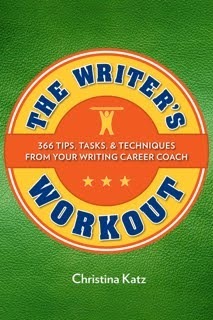 How is The Writer's Workout different from other writing books already out there?
How is The Writer's Workout different from other writing books already out there?One thing that makes The Writer's Workout unique is that the rise and fall of the how-to curve is set against the backdrop of the seasons of the year. The seasonal backdrop helped me deliver advice for writers on four levels: beginner, intermediate, seasoned pro, and veteran—each paralleling a season: spring, summer, fall, or winter. The result, I hope, is one idea every day that will help writers find and maintain literary momentum all year long in these highly distracted times.
Some people say these are tough times for writers. Others say there are opportunities around every corner. What do you say?
I say we are living in a gig economy, where professionals are stringing freelance jobs together into creative careers. We're all doing the best we can, finding and maintaining our momentum. Not only can The Writer's Workout assist folks who are just getting started supplementing their income with writing, it can help people who have already been writing professionally recognize that there are more opportunities to build income streams writing than any of us have realized. And then it's just a matter of choosing the goals that will best suit your goals.
How did you come to write The Writer's Workout?
Prior to landing the deal for this book, I was offered the opportunity to write a different book about how to be an organized writer—a topic that, unfortunately, did not feel like a good fit for the way I work.
I recommended a former student for the job and started asking myself, if not that book, then what book did I want to write? Jane Friedman, then publisher at Writer's Digest, and I sat down in an airport restaurant after the Writer's Digest conference in January 2010, and brainstormed the idea that evolved into The Writer's Workout. Basically, I wanted to encapsulate everything that I'd learned from working closely with hundreds of writers over ten years. Two years and many thousands of words later, here it is.
The Writer's Workout is almost 400-pages long, yet you offer classes on writing "short stuff" and "micro-publishing." As a writer, how do you reconcile both shorter and longer works?
You have to look at it this way: the book is 366 short pieces collected and placed in an order that creates a longer movement. That's exactly how I was taught to write fiction in graduate school. This write short before you write long school-of-thought is also how I teach writers to draft and polish publishable work. We start short and then extend the jumps until, next thing you know, the writer is writing long pieces like features, e-books and even books. How? By pulling together shorter pieces to create longer pieces.
You have been called a "gentle taskmaster" by your students. What does this mean and why would writers need this kind of help?
A coach is a person who trains others to perform better. Every writer needs a kick in the pants now and then. This book has plenty of boots in the caboose and also acknowledges the challenging times we're living in. Reading this book is like having a personal coach for your writing career, who holds you accountable to your potential, every day of the year. Get this book if you would like to have your own personal coach without the massive expense of paying for one. You'll be your own best writing coach by the time the book is done.
Our workdays are constantly disrupted these days. What do you say to the writer who has trouble focusing and following through?
I rarely hear students in my training groups complaining about dramas or distractions in their lives. If something upsets their focus, it's a major life disturbance like a trip to the emergency room, a spouse's job loss, or a death in the family. That's life calling, not a distraction.
Our attention can be hijacked by one hundred and one meaningless distractions per minute. I say turn up the focus and the distractions will fall away. Drama and distraction are not necessary for self-expression but they sure can impede it. I say keep the drama on the page. You can get hooked on making grounded creative progress just as you can get hooked on chasing every distraction and fanning the flames of every potential drama. The cure for discouragement is accomplishing a short-term objective every day.
I understand The Writer's Workout originally had a different title. What was the original title?
The Writer's Workout actually had three previous titles. I'll share them if folks, who have read the book, will tell me which they think is the best match with the final version.
1. The first title was: Read. Write. Grow.
2. The second title was: The Everyday Writing Coach.
3. The third title was: The Anyday Writing Coach.
4. And the fourth and final title was: The Writer's Workout.
Personally, I prefer The Writer's Workout. But what does everyone else think?
Any final comments you would like to make in closing?
At the end of the day, it does not matter if you are self-published or traditionally published, blogging or not blogging, a book-sniffer or a digital diva, a social media maven or a social media deer-in-the-headlights—what matters is that you cultivate the creativity that wants to be expressed through you. That's your job. Go do it!Dallas Woodburn
author, speaker, freelance writer
founder of Write On! Books and Write On! For Literacy
www.writeonbooks.org
http://dallaswoodburn.blogspot.com/
March 9, 2012
Publication Opportunity: YA Anthology Looking for Historical Romances!
FROM PUGALICIOUS PRESS:
We are looking for YA short stories to include in our first ebook anthology, titled Timeless!
If your short story is between 3000 and 7500 words and fits into the genre of YA historical romance with some twists, we want to read it. The story can include steampunk, fantasy, or adventure, as long as it includes some historical elements then we are interested in reading it.
Submit the whole manuscript as a Word .doc file (no .docx) by March 30, 2012, with the subject heading: submission–YA anthology.Please include a bio, publishing credits if any, and a synopsis.Email: pugaliciouspress(at)gmail.com (replace (at) with @ in sending email)Website is http://pugaliciouspress.com/submissions/
Dallas Woodburn
author, speaker, freelance writer
founder of Write On! Books and Write On! For Literacy
www.writeonbooks.org
http://dallaswoodburn.blogspot.com/



